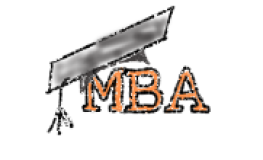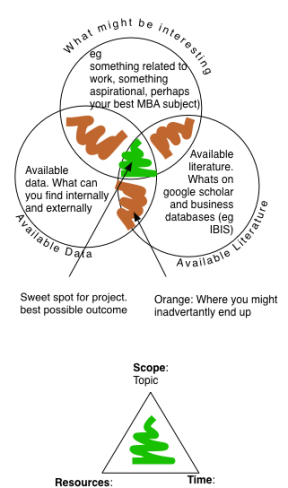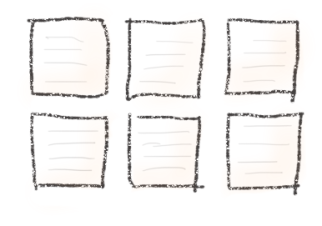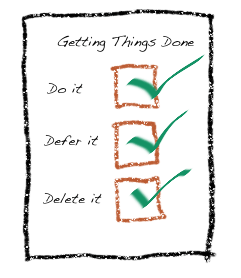 A few years back I finished an MBA. I didn’t set out to do one but thats where I ended up. There are wild MBA evangelists out there (‘it will change your life’) and the detractors (‘over hyped, you can learn this stuff from a book’) so this is my story.
A few years back I finished an MBA. I didn’t set out to do one but thats where I ended up. There are wild MBA evangelists out there (‘it will change your life’) and the detractors (‘over hyped, you can learn this stuff from a book’) so this is my story.
Establishing an intrapreneurial enterprise within a university almost a decade ago, on the back of a decade of working with industry, I had realised clients generally trusted me on the science, but something else was driving decisions and processes. More often than not the go-no-go decisions were out of my hands and made on something else e.g. market size, profitability, budget cycles or sometimes political issues. I read ( and still do) a lot of business books to try an get my head in the game, they were extremely useful but they only got me so far. Belonging (and being a board member) of some industry associations put me in a lot more regular contact with business speak, bootcamps ( just quietly…I’ve done a few to many of those), decision making and accelerated time frames (compared to glacial academic ones anyway), pretty soon I realised I need to take a plunge into something a bit more rigorous.
A Graduate Certificate in Business Administration was a great start, covering many of the basics including marketing, where I surprised myself by topping the class, HR because after all at least 50% of what I do was working with people… it just made sense. Probably the greatest single influence there was the first introductory subject where I did my first ever scenario analysis and projection on what I had being doing in my research lab for the last 10 years. It was like a lightbulb went off, suddenly I had a crystal ball into the future. It was a nice tool to compliment my intellectual curiosity lay and to balance the pull of the next pay check, both of whichhad been unconsciously positioning my work.
The successes were almost immediate for the bottom line. By riding trends (instead of fighting or trying to create them), consciously pursuing operational efficiency with technology tools and adopting internal lab standards everything became just that bit easier. It also gave me something more interesting to say at industry conferences than my latest algorithms 😉
Dial forward a few years and the tension of trying to be nimble in a large sluggish organisation, where sometimes I completed a ‘gig’ faster than an invoice could be issued ( and by faster it was only a few months of work) I decided to study up on entrepreneurship and innovation, (which turned out to be more than Malcom Turnbull’s latest buzz words).
Sadly my time at the helm of the entrepreneurial unit came to a close not long after, it had become mainstream enough that it was swallowed back into the loving arms of the tenured. So I took the opportunity to finish up a few more interesting subjects, in particular Strategy (which nicely complimented the first subject I started with) and a smattering of finance and accounting. Just for fun, in a project I looked into the growth of online tertiary education, eerily the case organisation I chose ended up just a year later confirming most the findings (yet unable to steer itself enough to take advantage of them)…how cool!!
Anyways thats my MBA story, thanks to Griffith, Stanford and Sunshine Coast universities I entered the wilderness of the gig economy better prepared than what one might expect from a yesteryear Physics PhD. For me an MBA hasn’t been a silver bullet, but rather a partner on the journey. Its been a gateway to new skills, surviving uncertainty and learning to enjoy the ride. I’m continuing to do research, consultancy with industry, with a side order of online teaching and working within some growing SME’s whilst raising a family too!
You can pay big bucks (or not so much) for an MBA, but thats something for another post …
 I just put some Tzigane strings on my violin (rather than my usual Dominant). They are a lower tension string, which I was told would be a bit kinder to my old french violin. In so doing its supposed to bring out its tone a bit better…and how true it was!
I just put some Tzigane strings on my violin (rather than my usual Dominant). They are a lower tension string, which I was told would be a bit kinder to my old french violin. In so doing its supposed to bring out its tone a bit better…and how true it was! I’m working at the moment with another cohort of MBA students on their capstone projects. Its a quite a challenge as the term is short and by necessity there is a strict word limit (thank God). Their ideas are often BIG as they want to hone their newly developed MBA skills and solve something they are passionate about!
I’m working at the moment with another cohort of MBA students on their capstone projects. Its a quite a challenge as the term is short and by necessity there is a strict word limit (thank God). Their ideas are often BIG as they want to hone their newly developed MBA skills and solve something they are passionate about! A few years back I finished an MBA. I didn’t set out to do one but thats where I ended up. There are wild MBA evangelists out there (‘it will change your life’) and the detractors (‘over hyped, you can learn this stuff from a book’) so this is my story.
A few years back I finished an MBA. I didn’t set out to do one but thats where I ended up. There are wild MBA evangelists out there (‘it will change your life’) and the detractors (‘over hyped, you can learn this stuff from a book’) so this is my story.
 One of my favourite books of all time, in the productivity space is Getting Things Done by David Allen. Its a great read and i was able to take away a few key things that enhanced my ability to get things done! Probably the most important one is his process for looking at emails which can easily become the scourge and time eater of your day, but its also really handy for the short jobs that crop up during the day. If its quick then just Do it on the spot, if its going to take a bit longer then Defer it (but make sure you capture than in some system like flagging it a list or calendar entry or just Delete it. These days with email being what it is I don’t tend to delete , I just let it run off the bottom of the screen..it’s pretty much the same thing.
One of my favourite books of all time, in the productivity space is Getting Things Done by David Allen. Its a great read and i was able to take away a few key things that enhanced my ability to get things done! Probably the most important one is his process for looking at emails which can easily become the scourge and time eater of your day, but its also really handy for the short jobs that crop up during the day. If its quick then just Do it on the spot, if its going to take a bit longer then Defer it (but make sure you capture than in some system like flagging it a list or calendar entry or just Delete it. These days with email being what it is I don’t tend to delete , I just let it run off the bottom of the screen..it’s pretty much the same thing.